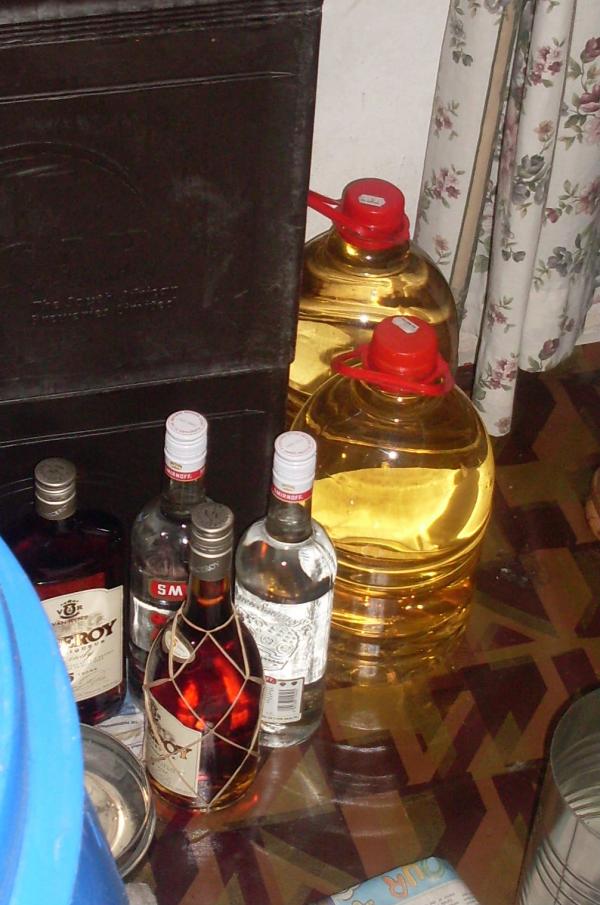Cheap wine trending in townships

Papsak, wyn, umtshove alale, whichever way you choose to refer to it, cheap wine has become popular in our townships even though it might be dangerous to your health.
I recently attended a family gathering, umcimbi, in Gugulethu. All the usual faces were there: family, neighbours, friends, old men and women from the area. The yard was packed.
As I walked into “the room” in the house—there is always a room set-up for umcimbi—I came across the usual, a big drum of umqombothi (African beer), bottles of strong alcohol, and tobacco. Next to these, were two transparent 5-litre bottles containing a golden liquid. I had seen two of these bottles lying in the yard outside, empty.
These papsak wines are sold under names such as Hard Val or Cape’s Best and cost about R30 at local shebeens. Papsakke or wine sold in foil bags, were banned in 2007 by the SA Wine Industry, but later cheap wine resurfaced in plastic containers.
This is the same wine that temporarily paralysed our family friend, Bra Jazz, a month ago, leaving him sitting in the dark outside, on the bench, unable to move no matter how much he wanted to. He would manage to stand up briefly only to fall down again. His whole body had entered a mild stroke-like state. He eventually recovered a few hours later.
Social Justice Coalition’s campaign coordinator, Mandla Majola says, “Once a person drinks it, then that is it, it’s over, that person has officially lost their lease on life. I live with people who drink umtshovi in the community (Guguletu) and they don’t have a life. As parents they neglect their families and children. Their health deteriorates. They are dirty and they just stop caring about everything. In most cases you find that these people are talented and some of them dropped out of university. Umtshovi is the worst form of alcohol, one that instantly makes you lose your dignity,” said Majola.
Professor Leslie London from the School of Public Health & Family Medicine at the University of Cape Town explains that papsak was wine with a legal alcohol content. “Papsak wine is generally sold in containers which have a tap which cannot be closed, so you need to drink a lot of it quickly, once it is open. I suspect that the way it is drunk, rather than what is in the wine is the reason for people to be very drunk. The association of papsakke is with people drinking till they get completely drunk. ‘Paralytic’ is the adjective for the dazed and mild stroke-like state.”
According to London, papsak is produced by relatively few wine co-operatives in the region, mainly on the West Coast, and most wine producers are “quite hostile” to it because it is bad for business and brings the wine industry into disrepute.
“We did some sampling of papsak wine for the liquor board some years ago. We found that it was contaminated with heavy metals at concentrations that would be of concern if you were to find the same in drinking water. Some people drink a lot of wine and papsak wine, so the presence of heavy metals in wine is of concern. Most heavy metals are toxins for the human nervous system. We also found that some chemicals called phthalates which come from plastics appeared in the wine and were probably released from the plastic lining inside the papsak, particularly as the storage conditions of most papsak wine is very poor (not refrigerated, left out in the sun),” London explained.
A Gugulethu shebeen owner, who gave his name as Mncedisi, said umtshove alale was very popular. He sold the 5-litre for R35 and he stocked about 50 bottles a week. “It is mostly bought by the aunties and uncles who are unemployed or who have piece-jobs because it is cheap and it does the trick.”
London says, “What we understand is that in September 2007 the Liquor Products Act 60 of 1989 was amended to prevent the sale of alcohol in bags that were not-self-supporting and that could not be resealed and to prohibit the retail sale of alcohol in containers exceeding 5 litres. So people consume small papsak containers, but the intent is to ban them entirely. Easy accessibility of alcohol is the biggest problem we’re facing in our communities, putting bulk wine into easy to access containers at dirt cheap prices is inviting excessive drinking.”
Next: Clanwilliam hosts Khoi San dance competition
Previous: Young girl competes in the 2012 Rieldans competition.

This article is licensed under a Creative Commons Attribution-NoDerivatives 4.0 International License.


